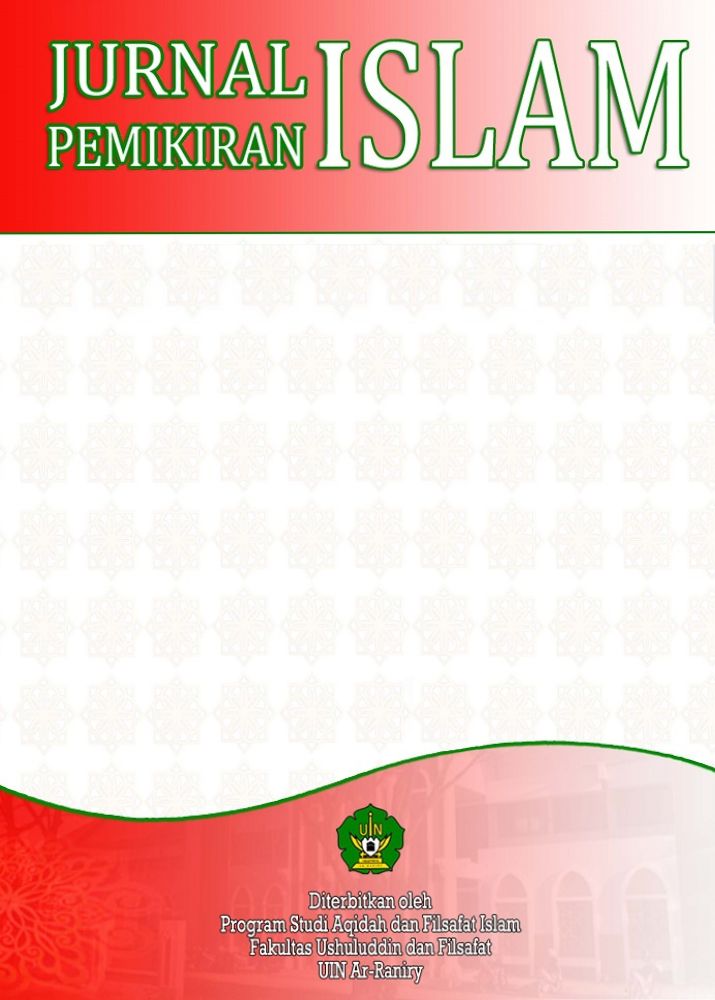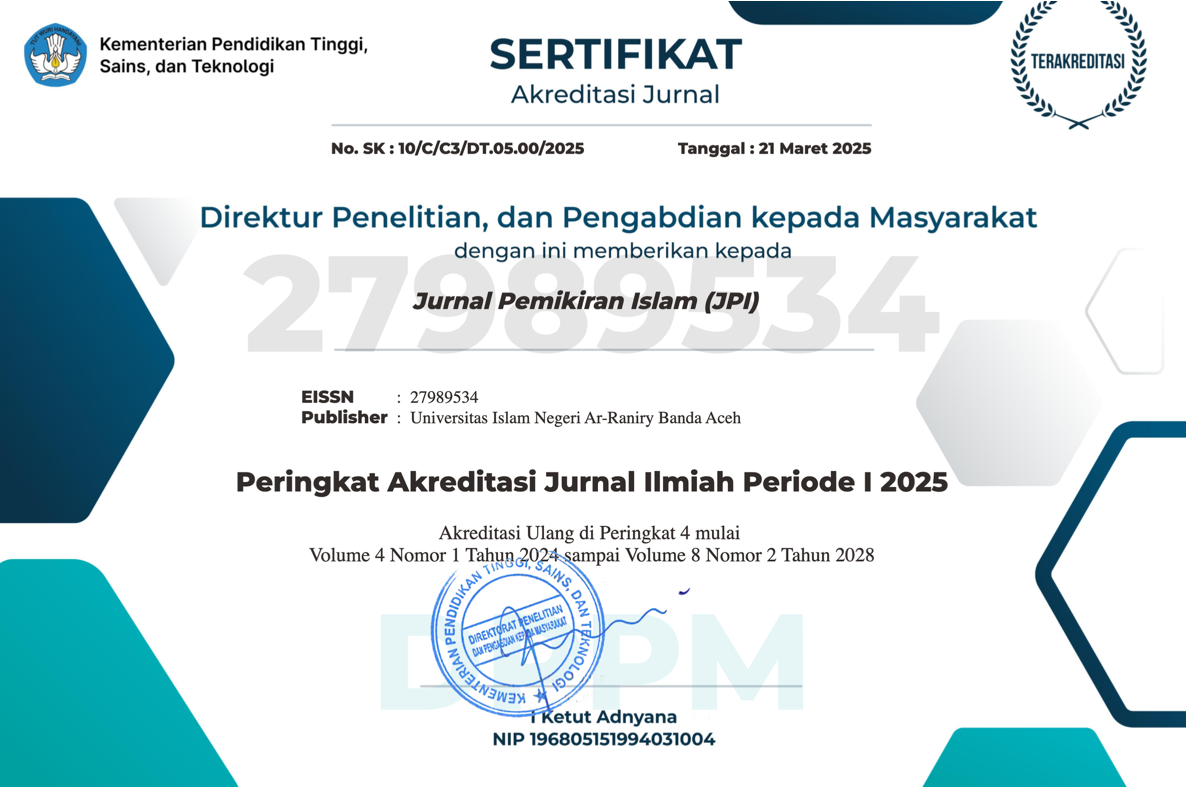Actualizing Sufi Values for the Moral Formation of Qur’an Memorizing Students: A Case Study at Al-Huffaazh, Simalungun
DOI:
https://doi.org/10.22373/jpi.v5i1.31574Keywords:
Student Morality, Sufism, Value Internalization, Tahfizh EducationAbstract
This study analyzes the actualization of students’ morality through the perspective of Sufism at the Tahfizh Qur’an Al-Huffaazh Foundation in Perdagangan, Simalungun Regency. Utilizing a qualitative case study approach, data were collected through in-depth interviews, participant observation, and document analysis. The findings demonstrate that the internalization of Sufi values—such as sincerity (ikhlas), patience (sabar), trust in God (tawakkal), and humility (tawadhu)—is authentically manifested in the students’ daily lives through habitual practice, exemplary conduct, and sustained supervision. These values significantly shape students’ character, enhance the quality of Qur’anic memorization, and foster both religious discipline and everyday behavior. Nonetheless, challenges exist, both internal (e.g., peer influence) and external (e.g., gadget usage, social media, and romantic relationships). The foundation has implemented adaptive strategies, including restricting mobile phone usage, optimizing halaqah (group mentoring), individualized guidance, and collaborating with parents to address these issues. The study underscores the urgency of an innovative, collaborative Sufi-based moral education model as a solution for nurturing Qur’anic generations with noble character in the digital era.
Downloads
References
Abdullah, M. (2007). Studi akhlak dalam perspektif Al-Qur'an. Jakarta: Azmah.
Achmad Juanedi Sitika, A. A. (2024). Kedudukan akhlak dan tasawuf dalam Islam serta hubungan keduanya. ANSIRU PAI: Pengemangan Profesi PAI, 116.
Adis Mulyadi, M. S. (2023). Analisis sistem penerapan sikap tawadhu di Pondok Pesantren Al-Barkoah (studi analisis mahasiswa Universitas Pendidikan Indonesia). Jurnal Pendidikan Islam, 33–35.
Ahmad Aqif Syauqi, A. M. (2024). Implementasi pembelajaran akhlak tasawuf dalam meningkatkan karakter demokratis mahasiswa PAI FITK UNSIQ 2023. Mutiara: Jurnal Penelitian dan Karya Ilmiah, 125–127.
Creswell, J. W. (2014). Research design: Qualitative, quantitative, and mixed methods approaches (4th ed.). Thousand Oaks, CA: Sage.
Dede Setiawan, S. M. (2021). Tawakal dalam Al-Qur'an serta implikasinya dalam menghadapi pandemi Covid-19. Jurnal Studi Al-Qur'an Membangun Tradisi Berfikir Qur'ani, 5–9.
Diklat, T. L.-Q. (2010). Tafsir Al-Qur'an tematik: Pendidikan, pengembangan karakter, dan pengembangan sumber daya manusia. Jakarta: Kementerian Agama RI.
Hery Nugroho, A. R. (2021). Pendidikan Agama Islam dan Budi Pekerti untuk SMA/SMK Kelas XI. Jakarta: Pusat Perbukuan Badan Standar, Kurikulum, dan Asesmen Pendidikan Kemendikbud.
Mahmud, A. (2019). Ciri dan keistimewaan akhlak dalam Islam. Sulesana, 35–36.
Mashar, A. (2020). Pengantar tasawuf: Sejarah, madzhab, dan ajaran. Surakarta: SPI FAB UIN Raden Mas Said Surakarta.
Miles, M. B., Huberman, A. M., & Saldana, J. (2014). Qualitative data analysis: A methods sourcebook (3rd ed.). Thousand Oaks, CA: Sage.
Miskahuddin. (2020). Konsep sabar dalam perspektif Al-Qur'an. Jurnal Ilmiah Al Mu'Ashirah, 198–199.
Moleong, L. J. (2017). Metodologi penelitian kualitatif (Edisi Revisi). Bandung: Remaja Rosdakarya.
Muzakkir. (2018). Tasawuf: Pemikiran, ajaran dan relevansinya dalam kehidupan. Medan: Perdana Publishing.
Nasywa Qriyayna La'aly, M. W. (2024). Pendekatan akhlak tasawuf dalam pendidikan dasar untuk membentuk karakter Islami. Cipulus Edu: Jurnal Pendidikan Islam, 44.
Nur, F. M. (2024). Diktat mata kuliah tasawuf akhlaqy. Banda Aceh: UIN Ar-Raniry Banda Aceh.
Nur Yasin, S. (2020). Penerapan nilai-nilai tasawuf dalam pembinaan akhlak santri pada Pondok Pesantren Miftahul Huda Gading Malang. Al-Musannif: Journal of Islamic Education and Teacher Training, 49.
Nurul Hidayah, d. (2023). Konsep ikhlas menurut Imam Al-Ghazali dan relevansinya terhadap pendidikan Agama Islam. Urwatul Wutsqo: Jurnal Studi Kependidikan dan Keislaman, 168.
Nurul Huda, M. (2024). Penerapan nilai-nilai tasawuf dalam pembinaan akhlak santri pada Pondok Pesantren Al-Mukhlisin. Jurnal Education: Jurnal Pendidikan Indonesia, 335.
Rahman, A. (2020). Tasawuf akhlaki: Ilmu tasawuf yang berkonsentrasi dalam perbaikan akhlak. Parepare: Kaaffah Learning Center.
Sidiq, H. S. (2024). Akhlak tasawuf. Eksekusi: Jurnal Ilmu Hukum dan Administrasi Negara, 89.
Sugiyono. (2019). Metode penelitian kualitatif, kuantitatif, dan R&D. Bandung: Alfabeta.
Sugiarto, A. B. (2021). Tesis: Pendidikan akhlak dengan pendekatan tasawuf di Pondok Pesantren Al-Munawirussholeh. Lampung: UIN Raden Intan Lampung.
Suhayib. (2016). Studi akhlak. Yogyakarta: Kalimedia.
Syukri. (2024). Buku monograf filsafat Islam dan tantangan modernitas. Padang Sidempuan: PT Inovasi Pratama Internasional.
Tsalitsah, I. M. (2020). Akhlaq dalam perspektif Islam. Al-Hikmah: Jurnal Studi Agama-Agama, 112–124.
Yin, R. K. (2018). Case study research and applications: Design and methods (6th ed.). Thousand Oaks, CA: Sage.
Zakiyah. (2019). Akhlak dan penerapannya di Rumah Tafhfizh Miftahul Jannah Kelurahan Bantan Kecamatan Medan Tembung. Medan: Fakultas Ushuluddin dan Studi Islam, Universitas Islam Negeri Sumatera Utara.
Downloads
Published
Issue
Section
License
Copyright (c) 2025 Indri Apriliani, Syukri Syukri

This work is licensed under a Creative Commons Attribution-NonCommercial-ShareAlike 4.0 International License.
Authors who publish in Jurnal Pemikiran Islam agree to the following terms:
- Authors retain copyright and grant the journal right of first publication with the work simultaneously licensed Attribution-NonCommercial-ShareAlike 4.0 International (CC BY-NC-SA 4.0) that allows others to share the work with an acknowledgment of the work's authorship and initial publication in this journal.
- Authors are able to enter into separate, additional contractual arrangements for the non-exclusive distribution of the journal's published version of the work (e.g., post it to an institutional repository or publish it in a book), with an acknowledgment of its initial publication in this journal.
- Authors are permitted and encouraged to post their work online (e.g., in institutional repositories or on their website) prior to and during the submission process, as it can lead to productive exchanges, as well as earlier and greater citation of published work. (See The Effect of Open Acces)















